Related Research Articles
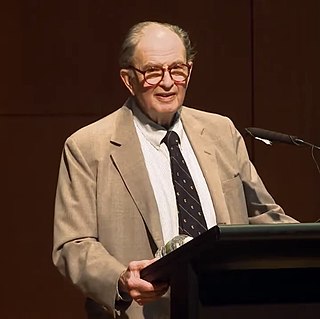
Bernard Bailyn was an American historian, author, and academic specializing in U.S. Colonial and Revolutionary-era History. He was a professor at Harvard University from 1953. Bailyn won the Pulitzer Prize for History twice. In 1998 the National Endowment for the Humanities selected him for the Jefferson Lecture. He was a recipient of the 2010 National Humanities Medal.
Bernard Wasserstein is a British and American historian.
Gerald James Holton is an American physicist, historian of science, and educator, whose professional interests also include philosophy of science and the fostering of careers of young men and women. He is Mallinckrodt Professor of Physics and professor of the history of science, emeritus, at Harvard University. His contributions range from physical science and its history to their professional and public understanding, from studies on gender problems and ethics in science careers to those on the role of immigrants. These have been acknowledged by an unusually wide spectrum of appointments and honors, from physics to initiatives in education and other national, societal issues, to contributions for which he was selected, as the first scientist, to give the tenth annual Jefferson Lecture that the National Endowment for the Humanities describes as, “the highest honor the federal government confers for distinguished achievement in the humanities”.
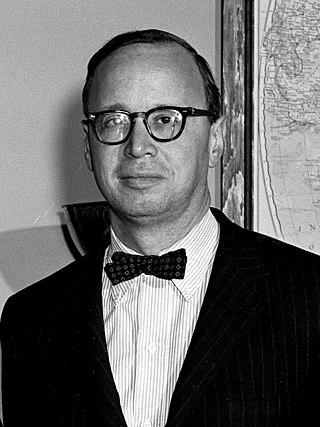
Arthur Meier Schlesinger Jr. was an American historian, social critic, and public intellectual. The son of the influential historian Arthur M. Schlesinger Sr. and a specialist in American history, much of Schlesinger's work explored the history of 20th-century American liberalism. In particular, his work focused on leaders such as Harry S. Truman, Franklin D. Roosevelt, John F. Kennedy, and Robert F. Kennedy. In the 1952 and 1956 presidential campaigns, he was a primary speechwriter and adviser to the Democratic presidential nominee, Adlai Stevenson II. Schlesinger served as special assistant and "court historian" to President Kennedy from 1961 to 1963. He wrote a detailed account of the Kennedy administration, from the 1960 presidential campaign to the president's state funeral, titled A Thousand Days: John F. Kennedy in the White House, which won the 1966 Pulitzer Prize for Biography or Autobiography.
Valdimer Orlando Key Jr. was an American political scientist known for his empirical study of American elections and voting behavior. He taught at Johns Hopkins University and Harvard.

Anthony Thomas Grafton is an American historian of early modern Europe and the Henry Putnam University Professor of History at Princeton University, where he is also the Director the Program in European Cultural Studies. He is also a corresponding fellow of the British Academy and a recipient of the Balzan Prize. From January 2011 to January 2012, he served as the President of the American Historical Association. From 2006 to 2020, Grafton was co-executive editor of the Journal of the History of Ideas.
The American Council of Learned Societies (ACLS) is a private, nonprofit federation of 75 scholarly organizations in the humanities and related social sciences founded in 1919. It is best known for its fellowship competitions which provide a range of opportunities for scholars in the humanities and related social sciences at all career stages, from graduate students to distinguished professors to independent scholars, working with a number of disciplines and methodologies in the U.S. and abroad.
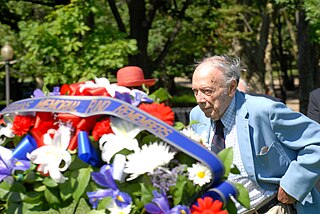
Stanley Abram Karnow was an American journalist and historian. He is best known for his writings on East Asia and the Vietnam War.
John Haughton D'Arms was the Gerald F. Else Professor of Humanities and professor of classical studies and history at the University of Michigan in Ann Arbor. He also served as president of the American Council of Learned Societies (ACLS). He served ACLS until his death in 2002. He died of brain cancer in New York City.
Max Lynn Stackhouse was the Rimmer and Ruth de Vries Professor of Reformed Theology and Public Life Emeritus at Princeton Theological Seminary. He was ordained in the United Church of Christ and was the president of the Berkshire Institute for Theology and the Arts.
Douglas Greenberg is professor emeritus of history at Rutgers, the State University of New Jersey. Previously, he was executive dean of the School of Arts and Sciences (2008–2012) at Rutgers. In the past, he served as a professor of history at the University of Southern California, executive director of the USC Shoah Foundation Institute for Visual History and Education, and president of the Chicago Historical Society.
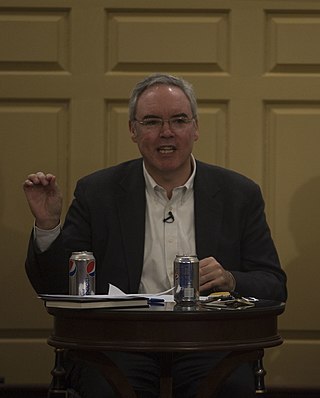
Thomas J. Sugrue is an American historian of the 20th-century United States currently serving as a professor at New York University. From 1991 to 2015, he was the David Boies Professor of History and Sociology at the University of Pennsylvania and founding director of the Penn Social Science and Policy Forum. His areas of expertise include American urban history, American political history, housing and the history of race relations. He has published extensively on the history of liberalism and conservatism, on housing and real estate, on poverty and public policy, on civil rights, and on the history of affirmative action.
Svetlana Leontief Alpers is an American art historian, also a professor, writer and critic. Her specialty is Dutch Golden Age painting, a field she revolutionized with her 1984 book The Art of Describing. She has also written on Tiepolo, Rubens, Bruegel, and Velázquez, among others.
Herbert Feis was an American historian, author, and economist who was the Advisor on International Economic Affairs in the US Department of State during the Herbert Hoover and Franklin Roosevelt administrations.
Theodore K. Rabb was an American historian specializing in the early modern period of European history. He was a Professor Emeritus in the Department of History at Princeton University. He was one of the leading scholars in the field of 16th- and 17th-century Europe, focusing on varying topics such as climate history and food history.

The Dictionary of American Biography (DAB) was a multi-volume dictionary published in New York City by Charles Scribner's Sons under the auspices of the American Council of Learned Societies (ACLS).
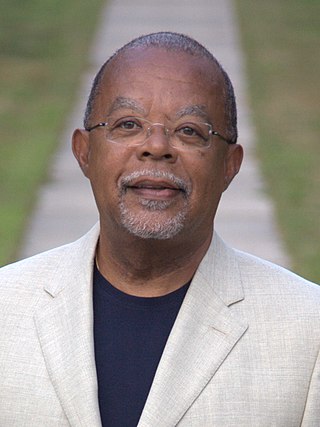
Henry Louis Gates Jr. is an American literary critic, professor, historian, and filmmaker who serves as the Alphonse Fletcher University Professor and the director of the Hutchins Center for African and African American Research at Harvard University. He is a trustee of the Gilder Lehrman Institute of American History. He rediscovered the earliest known African-American novels and has published extensively on the recognition of African-American literature as part of the Western canon.
Richard Slator Dunn was an American author and historian.
Joshua Timothy Katz is an American linguist and classicist who was the Cotsen Professor in the Humanities at Princeton University until May 2022. He is a scholar on the languages, literatures, and cultures of ancient and medieval history. Currently, he is a senior fellow at the American Enterprise Institute.
Neil Harris is an American cultural historian. He is the Preston and Sterling Morton Professor of History and Art History Emeritus at the University of Chicago.
References
- ↑ "Stanley Nider Katz". American Academy of Arts & Sciences. Retrieved 2021-12-13.
- ↑ "APS Member History". search.amphilsoc.org. Retrieved 2021-12-13.
- ↑ "Board". 5 September 2017.
- "Stanley Nider Katz." Directory of American Scholars. Gale, 2002. Gale Biography In Context. Web. 2 Mar. 2011.
- "Stanley Nider Katz." Contemporary Authors Online. Detroit: Gale, 2001. Gale Biography In Context. Web. 2 Mar. 2011.